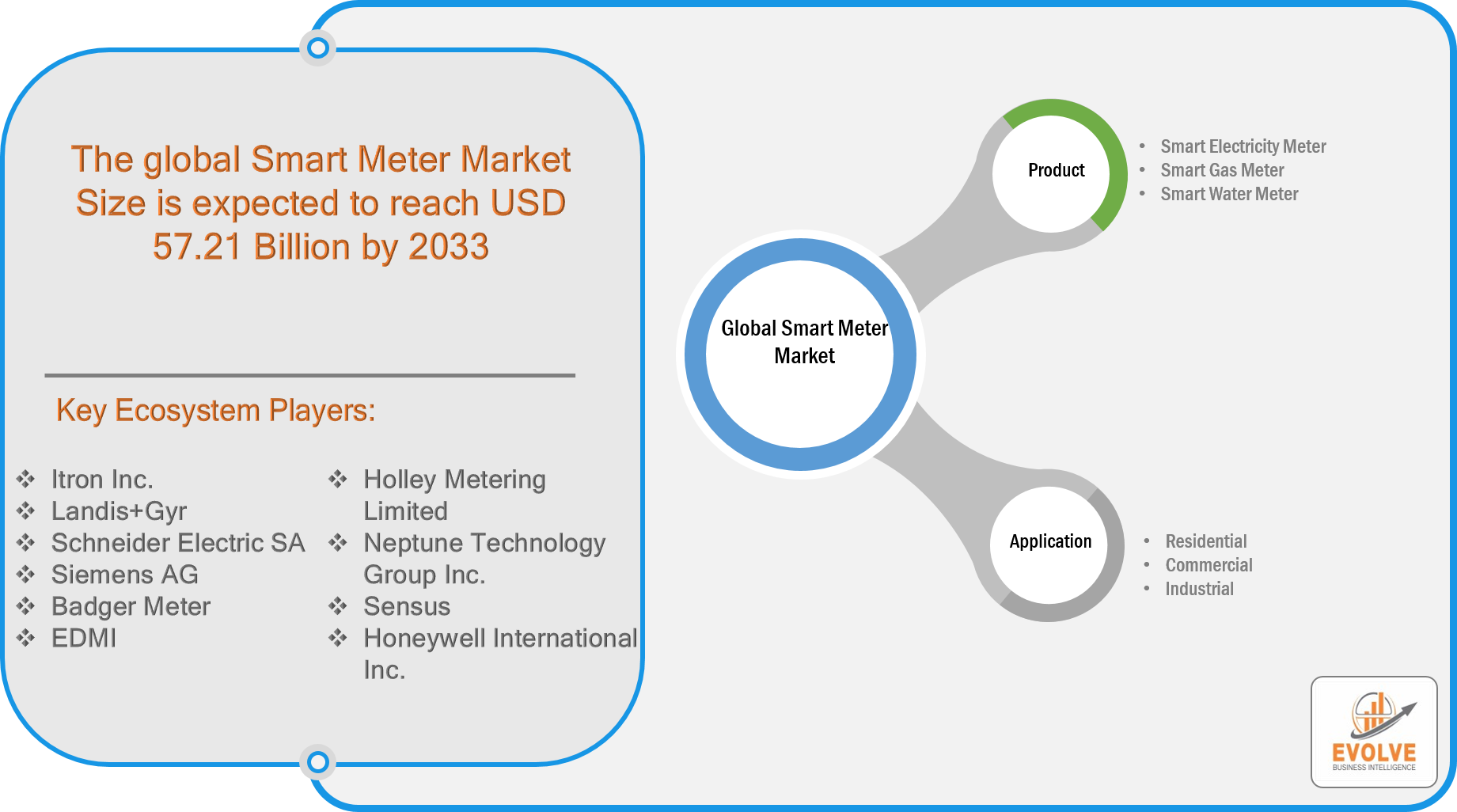The Global Smart Meter Market Is Estimated To Record a CAGR of Around 9.66% During The Forecast Period

Evolve Business Intelligence has published a research report on the Global Smart Meter Market, 2023–2033. The global Smart Meter market is projected to exhibit a CAGR of around 9.66%during the forecast period of 2023 to 2033.
Evolve Business Intelligence has recognized the following companies as the key players in the global Smart Meter Market: Itron Inc., Landis+Gyr, Schneider Electric SA, Siemens AG, Badger Meter, EDMI, Holley Metering Limited, Neptune Technology Group Inc., Sensus, and Honeywell International Inc.
Market Highlights
The global Smart Meter Market Size is expected to reach USD 57.21 Billion by 2033. The global Smart Meter industry size accounted for USD 22.75 Billion in 2023 and is expected to expand at a compound annual growth rate (CAGR) of 9.66% from 2023 to 2033. The smart meter market refers to the industry involved in the production, distribution, and implementation of smart meters. A smart meter is an advanced energy meter that measures and records electricity consumption in real-time. It is equipped with communication capabilities to transmit the data to utility companies for accurate billing and monitoring purposes. Smart meters enable consumers to have better control over their energy consumption, promote energy efficiency, and support the integration of renewable energy sources into the power grid.
For More Information: https://evolvebi.com/report/smart-meter-market-analysis/
The COVID-19 pandemic has had both positive and negative impacts on the smart meter market. On one hand, the pandemic highlighted the importance of remote monitoring and control of energy consumption, leading to increased interest in smart meter installations. Lockdowns and work-from-home arrangements also drove up residential energy consumption, further emphasizing the need for accurate metering and billing. Additionally, smart meters facilitated remote reading and eliminated the need for physical meter reading visits during the pandemic, ensuring the safety of metering personnel.
On the other hand, the pandemic disrupted supply chains and manufacturing activities, causing delays in smart meter deployments. Reduced economic activity and financial constraints faced by utilities and consumers also affected the adoption rate of smart meters in certain regions. The pandemic-induced economic slowdown and uncertainty might have temporarily impacted investment plans and slowed down market growth.
Segmental Analysis
The global Smart Meter market has been segmented based on Product, and End-use.
Based on the Product, the Smart Meter market is segmented into Smart Electricity Meter, Smart Gas Meter, and Smart Water Meter. The Smart Electricity Meter segment is expected to have the larger market share throughout the forecast period.
Based on End-use, the global Smart Meter market has been divided into Residential, Commercial, and Industrial. The Residential segment is anticipated to dominate the market.
For More Information: https://evolvebi.com/report/smart-meter-market-analysis/
Regional Analysis
The Smart Meter market is divided into five regions: North India, Europe, Asia-Pacific, South India, and Middle East, &Africa. Among these regions, The smart meter market in North America is well-established, with significant deployments in the United States and Canada. Government mandates and initiatives, such as the American Recovery and Reinvestment Act in the U.S., have driven widespread adoption. The market focuses on improving grid reliability, demand response programs, and empowering consumers with real-time energy data. Europe is one of the leading regions in smart meter deployment. The European Union has set targets for member states to achieve near-universal smart meter coverage. Countries like the United Kingdom, Italy, and Spain have made significant progress in implementing smart metering infrastructure to enhance energy efficiency and enable dynamic pricing. The smart meter market in Asia Pacific is experiencing rapid growth due to increasing urbanization, industrialization, and government initiatives promoting smart grid infrastructure. China, Japan, South Korea, and India are key players in the region. These countries focus on addressing energy demand-supply gaps, reducing non-technical losses, and improving grid management.


